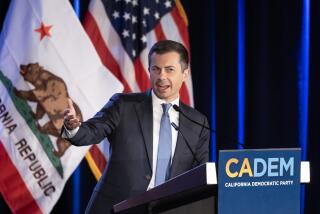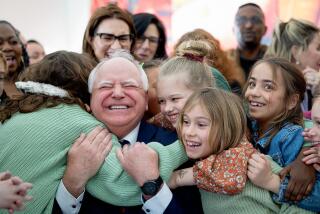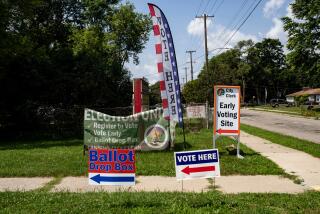GOP Nominating Process Gets Shaky Michigan Start
LANSING, Mich. — The process of nominating the next Republican candidate for the presidency got off to its earliest start in modern political history in the Michigan primary Tuesday under a haze of confusion and controversy.
The confusion stemmed from the fact that several hundred thousand primary voters had no way of telling from their ballots what connection there was between this election and the three 1988 GOP presidential prospects who have been seeking support here--Vice President George Bush, television evangelist Pat Robertson and New York Rep. Jack Kemp.
The contenders’ efforts have been focused on the contest for more than 10,000 precinct delegates from all over the state who will ultimately shape the Michigan delegation to the 1988 Republican nominating convention. Together, the three undeclared presidential candidates and their supporters have spent hundreds of thousands of dollars and countless days trying to get the voters to elect precinct delegates favorably disposed toward their respective White House ambitions.
However, this proved to be a hard point to get across to the voters in an election whose main purpose was the nominating of a Republican candidate for governor to oppose Democratic Gov. James J. Blanchard.
A statewide exit poll of Republican voters by WDIV-TV of Detroit showed that only 28% of the voters surveyed knew which precinct delegate was associated with which presidential candidate.
Asked whether they had even bothered to vote for precinct delegates, 28% said no and another 8% did not remember.
Controversy developed even before the polls closed at 8 p.m., when Bush’s managers here released to the press a list of more than 1,900 precinct delegate candidates in contested races who were said to be favorable to Bush. At a subsequent press conference, Robertson’s strategist contended that after reviewing a portion of Bush’s list, about 15% of the delegates claimed by the Bush forces were actually loyal to Robertson.
The precinct delegate contests aside, exit polls suggested that Bush ranked high among the state’s Republicans. In an NBC exit poll, about 2,000 voters who were asked their choice for presidential nominee, about 40% favored Bush. None of his potential opponents scored in double figures.
Leader in Exit Polls
Exit poll results both from WDIV and NBC also indicated that in the four-way race for the GOP nomination to oppose Blanchard, William Lucas, the black former Democrat who is executive of Wayne County (Detroit) was running well ahead of his nearest opponent, businessman Richard P. Chrysler, no relation to the Big Three auto family.
State Rep. Colleen Engler of Mount Pleasant and Oakland County Executive Daniel Murphy were far behind. In the Democratic primary, Blanchard was expected to have no trouble defeating Henry Wilson of Detroit, a supporter of radical politician Lyndon H. LaRouche Jr.
The collision in this state between supporters of three prospective presidential candidates two years before the national nominating convention was a result of a combination of circumstances, some calculated and some accidental.
To begin with, Michigan Republican leaders were determined to increase their influence in the GOP presidential competition by getting an early start in the nominating process. Their resolve was strengthened by memories of the 1980 campaign, when the Michigan primary was held in May. In that primary, Bush defeated Ronald Reagan, but the result turned out to be meaningless because Reagan had by then clinched the nomination.
Activity Helps Fund Raising
Another reason for turning the state primary into an early 1988 presidential battleground was financial. With the party low on funds, Michigan GOP leaders reckoned--correctly as it turned out--that offering an early opportunity to win convention delegates and media attention would attract presidential candidates whose appearances in the state would put money in the party’s coffers.
At first, it was generally assumed by political professionals that Bush would capture most of the delegates in Michigan with ease, because of the strength he had shown in winning the 1980 primary and because of his close ties to local party leaders.
But then Bush’s supporters became concerned about indications that Kemp, considered by many to be Bush’s strongest rival for the nomination, was seeking to organize his support in Michigan with an eye on the contest for precinct delegates.
Makes Frequent Trips
To avoid being ‘blindsided,’ as Bush put it, in Michigan by Kemp, the vice president’s backers stepped up their efforts and Bush made frequent trips to the state, ostensibly to help other GOP candidates.
Meanwhile, backers of Robertson began recruiting conservative Christians, mosts of them presumed to be favorable to Robertson’s presidential candidacy, to run as precinct delegate candidates. Robertson’s organization achieved a stunning surprise and projected Robertson on the national scene by enlisting nearly as many delegate candidates as Bush and substantially more than Kemp.
The Robertson and Bush organizations became the dominant forces in the campaign, forcing Kemp into the background. Last week Robertson’s forces sponsored a three-day sweep of the state by the evangelist, while the vice president’s strategists directed mass mailings to potential voters.
Ambiguous Conclusions
Despite all the activity and expense, because of the confusion over delegate loyalty, the meaning of the contest remained ambiguous.
Adding to the confusion was the malapportionment of precinct delegate slots among Michigan’s 83 counties.
Each county’s weight in the ultimate selection of the national convention delegation will be determined according to the county’s share of the statewide Republican vote. But party leaders in each county were allowed to create as many precinct delegate slots as they wished to put on the ballot in Tuesday’s vote.
Delegate’s Clout Varies
Party leaders in Genesee County (Flint) took the greatest advantage of this option so that the county, which contributed only 4% of the total vote in the state for President Reagan in 1984 has more than 3,800 precinct delegate slots--nearly 25% of the total number.
Thus each delegate elected in Genesee County will have proportionately much less influence on the nominating process than delegates elected in most other counties.
There were a number of delegate slots with no candidate on the ballot, and the next stage in the selection process will take place next week when delegates elected Tuesday will assemble at county conventions, at which the vacant precinct delegate slots will be filled.
At subsequent county conventions, to be held early in 1988, delegates to the state convention will be selected. It is this state convention that will select the 77-vote Michigan contingent to the national convention.
Voters also went to the polls Tuesday in Missouri and Kansas. In Missouri, they nominated Democratic Lt. Gov. Harriett Woods and former Republican Gov. Christopher Bond to vie for the seat of retiring Sen. Thomas F. Eagleton.
In Kansas, Senate Majority Leader Bob Dole was expected to win nomination for a fourth term easily. Five little-known Democrats were seeking a chance to face Dole. In the gubernatorial race, seven Republicans sought to run against Lt. Gov. Tom Docking to succeed Democratic Gov. John Carlin.
More to Read
Get the L.A. Times Politics newsletter
Deeply reported insights into legislation, politics and policy from Sacramento, Washington and beyond. In your inbox three times per week.
You may occasionally receive promotional content from the Los Angeles Times.










